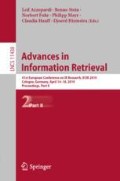Abstract
The huge amount of information that is available in social media today has resulted in a pressing demand for information retrieval models to support users in different retrieval tasks in this area. Evaluation of products or services based on other consumers’ reviews are examples of retrieval tasks where users benefit from the information in social media. However, as information in online reviews is provided from different customers, the reviews differ in their degree of credibility. Furthermore, not every detail of a product is reviewed but needs to be taken care when validating a product. Finally, reviews contain contradictions. In this work, we propose a logic-based pipeline to develop a social media retrieval model in which issues of credibility, omissions and contradictions are considered. For modeling these criteria, our approach depends on a probabilistic four-valued logic combined with an open world assumption which employs the unknown knowledge in retrieval tasks.
Access this chapter
Tax calculation will be finalised at checkout
Purchases are for personal use only
References
Razorfish. Feed: The Razorfish Consumer Experience Report (2008)
Akehurst, G.: User generated content: the use of blogs for tourism organisations and tourism consumers. Serv. Bus. 3(1), 51 (2009)
Katz, E., Lazarsfeld, P.F., Roper, E.: Personal Influence: The Part Played by People in the Flow of Mass Communications. Routledge, Abingdon (2017)
Nelson, P.: Information and consumer behavior. J. Polit. Econ. 78(2), 311–329 (1970)
Dowling, G.R., Staelin, R.: A model of perceived risk and intended risk-handling activity. J. Consum. Res. 21(1), 119–134 (1994)
Chen, Y., Xie, J.: Third-party product review and firm marketing strategy. Mark. Sci. 24(2), 218–240 (2005)
Zhang, K., et al.: Mining millions of reviews: a technique to rank products based on importance of reviews. In: Proceedings of the 13th International Conference on Electronic Commerce. ACM (2011)
Tian, P., et al.: Research of product ranking technology based on opinion mining. In: Second International Conference on Intelligent Computation Technology and Automation, ICICTA 2009, vol. 4. IEEE (2009)
Kong, R., et al.: Customer reviews for individual product feature-based ranking. In: 2011 First International Conference on Instrumentation, Measurement, Computer, Communication and Control. IEEE (2011)
Zhang, K., Narayanan, R., Choudhary, A.N.: Voice of the customers: mining online customer reviews for product feature-based ranking. WOSN 10, 11 (2010)
Belnap, N.D.: A useful four-valued logic. In: Dunn, J.M., Epstein, G. (eds.) Modern Uses of Multiple-Valued Logic. EPIS, vol. 2, pp. 5–37. Springer, Dordrecht (1977). https://doi.org/10.1007/978-94-010-1161-7_2
Frommholz, I.: A probabilistic framework for information modelling and retrieval based on user annotations on digital objects. Ph.D. thesis (2008)
Fuhr, N., Rölleke, T.: HySpirit — a probabilistic inference engine for hypermedia retrieval in large databases. In: Schek, H.-J., Alonso, G., Saltor, F., Ramos, I. (eds.) EDBT 1998. LNCS, vol. 1377, pp. 24–38. Springer, Heidelberg (1998). https://doi.org/10.1007/BFb0100975
Rölleke, T., Fuhr, N.: Retrieval of complex objects using a four-valued logic. In: Proceedings of the 19th Annual International ACM SIGIR Conference on Research and Development in Information Retrieval. ACM (1996)
Author information
Authors and Affiliations
Corresponding author
Editor information
Editors and Affiliations
Rights and permissions
Copyright information
© 2019 Springer Nature Switzerland AG
About this paper
Cite this paper
Sabbah, F. (2019). Logic-Based Models for Social Media Retrieval. In: Azzopardi, L., Stein, B., Fuhr, N., Mayr, P., Hauff, C., Hiemstra, D. (eds) Advances in Information Retrieval. ECIR 2019. Lecture Notes in Computer Science(), vol 11438. Springer, Cham. https://doi.org/10.1007/978-3-030-15719-7_47
Download citation
DOI: https://doi.org/10.1007/978-3-030-15719-7_47
Published:
Publisher Name: Springer, Cham
Print ISBN: 978-3-030-15718-0
Online ISBN: 978-3-030-15719-7
eBook Packages: Computer ScienceComputer Science (R0)

